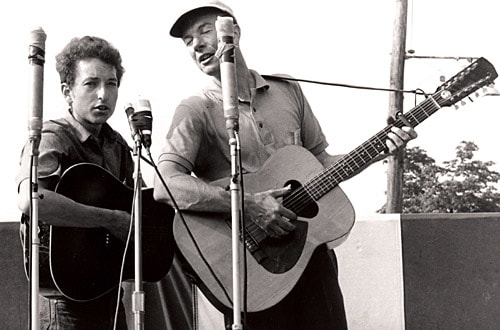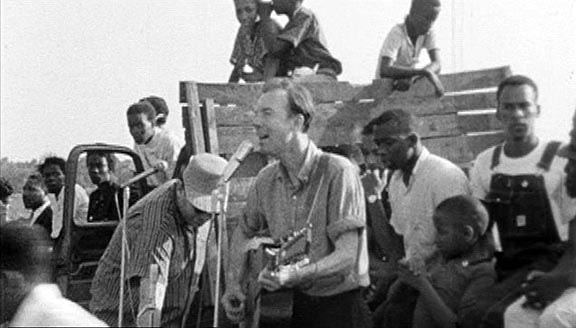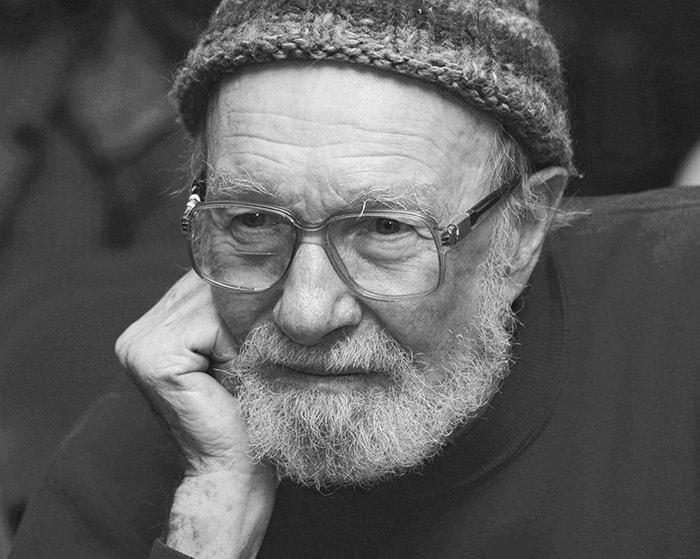Pete Seeger
1919-2014
On the US National Anthem |
On the philosopher Whitehead |
|
Pete Seeger, the banjo-picking troubadour who sang for migrant workers, college students and star-struck presidents in a career that introduced generations of Americans to their folk music heritage, died Monday, January 27, 2014, at the age of 94.
Seeger was born in New York City on May 3, 1919, into an artistic family whose roots traced to religious dissenters of colonial America. His mother, Constance, played violin and taught; his father, Charles, a musicologist, was a consultant to the Resettlement Administration, which gave artists work during the Depression. His uncle Alan Seeger, the poet, wrote I Have a Rendezvous With Death. "Every kid who ever sat around a campfire singing an old song is indebted in some way to Pete Seeger," Arlo Guthrie once said. I think we all have our story of how Pete got our love of music going. I came across the Weavers while in high school. I think that the music and Seeger influenced the guys I hung with, our emerging political consciousness. This continued unto University, where the folk circuit was active. I remember sitting in coffee houses listening to those inspired by Seeger. Of course the music evolved, Bob Dylan being one of those who pushed the genre. For me the circle was unbroken. It came to one transformational moment when I was a campus minister. Over beer a group of students and I dreamed who would we like to come and do a concert. Not knowing better we phoned him. It turned out he was on his way to an event in Alaska and he would stop in Vancouver. Meeting Pete Seeger Dreams became reality and we set out to put on the concert, connecting to those who know how to do sound and got the student ballroom. It was on and we, like fools, rushed into organizing the event. Over our heads but with confidence in his work and music. The weekend came and we sold out all the tickets. He stayed with us. This was his custom. And he had worked out the finances so our campus ministry would not lose money and if it worked some money for our ministry. The students hung out and showed him around the city. One great experience was in music store where the clerk did not know with whom he was talking, and tried to correct him about something Seeger was right about. Seeger took it good humour and did not embarrass the man. Over breakfast Seeger engaged my children and my niece. One son said today it was a time he will never forget. One of the boys looked at him and said “How is big bird?” This is how they knew him. He was on Sesame Street. Pete took the question seriously and explained to the kids how it worked. No talking down. The kids went off to school late with a story that lives with them. I learned some of what motivated him. His brother also went to Harvard and said to him, “come and hear this philosophy prof.” It was Alfred North Whitehead. And that was an influence on him. He also talked about spirituality as being the ground of human flourishing. Peace came to him as a dream, a gift. As I write this the CBC is playing his music, sung by him and others, and it makes me think of his compassion, exploration, care of the earth. We have been blessed by him and his music. George Hermanson |
|
Whitehead on Peace (by John Cobb)
If we ask what Whitehead considered the supreme value, the answer would be "peace". But this does not mean that peace encompasses all other values in such a way that they are only instrumental to it. Peace is a mode of being that may or may not come to a person. It comes unsought, rather than as a goal toward which life is oriented. Whitehead calls it a gift. We may think of it as a religious value.
*
Most people most of the time are far more concerned about their personal future than about the rest of the world. Whitehead describes this as "the soul’s preoccupation with itself." Morality calls them to broaden their horizons, and this introduces a tension. Much of the life of good people is lived in this tension. But Whitehead believes that there is also the possibility of ceasing to be preoccupied with one self, of really caring chiefly for the larger good. The overcoming of this tension by this change of the focus of desire is part of what he means by Peace.
*
We cannot calculate how to attain peace. We cannot calculate how to relate the immediate attainment of beauty to consequences for the future. We cannot calculate how to factor truth or adventure into the balance. We do much better to respond spontaneously to the opportunities of the moment.
However, the spontaneity we need must be distinguished from acting according to habit or in terms of a narrow self-interest. It must be a genuine response to the possibilities of the moment that builds on the past without being bound to it.
Whitehead believes that we have some intuition, however faint, of what this ideally creative response can be. To heighten sensitivity and willingness to take the risk of response is to grow in our ability to realize value within ourselves and to contribute to such realization in others.
At this point Whitehead’s thought connects with that of "situation ethics." According to this view, obeying moral rules is not the answer. What is truly right can only be determined in the full concreteness of the situation. The advocates of situation ethics believe that useful though knowledge of past reflection can be for acting in the concreteness of the situation, ultimately we must trust our own spontaneous intuition.
In his discussion of peace that I quoted, Whitehead speaks of a deep metaphysical intuition. He in fact works out of some such deep intuitions. One intuition is that the nature of reality is such that these needed spontaneous intuitions are possible and do occur. They are often confused with other factors in our experience, but we can grow in our ability to recognize them.
The creative possibilities in each situation differ from every other situation. Sometimes they are very limited indeed. The best possibility may still be very bad. But often they are much more open and promising. Believing in the relevance of new possibilities can keep us from rigidity and narrowness. It can lead us toward peace.
-- for the entire article click here
*
Most people most of the time are far more concerned about their personal future than about the rest of the world. Whitehead describes this as "the soul’s preoccupation with itself." Morality calls them to broaden their horizons, and this introduces a tension. Much of the life of good people is lived in this tension. But Whitehead believes that there is also the possibility of ceasing to be preoccupied with one self, of really caring chiefly for the larger good. The overcoming of this tension by this change of the focus of desire is part of what he means by Peace.
*
We cannot calculate how to attain peace. We cannot calculate how to relate the immediate attainment of beauty to consequences for the future. We cannot calculate how to factor truth or adventure into the balance. We do much better to respond spontaneously to the opportunities of the moment.
However, the spontaneity we need must be distinguished from acting according to habit or in terms of a narrow self-interest. It must be a genuine response to the possibilities of the moment that builds on the past without being bound to it.
Whitehead believes that we have some intuition, however faint, of what this ideally creative response can be. To heighten sensitivity and willingness to take the risk of response is to grow in our ability to realize value within ourselves and to contribute to such realization in others.
At this point Whitehead’s thought connects with that of "situation ethics." According to this view, obeying moral rules is not the answer. What is truly right can only be determined in the full concreteness of the situation. The advocates of situation ethics believe that useful though knowledge of past reflection can be for acting in the concreteness of the situation, ultimately we must trust our own spontaneous intuition.
In his discussion of peace that I quoted, Whitehead speaks of a deep metaphysical intuition. He in fact works out of some such deep intuitions. One intuition is that the nature of reality is such that these needed spontaneous intuitions are possible and do occur. They are often confused with other factors in our experience, but we can grow in our ability to recognize them.
The creative possibilities in each situation differ from every other situation. Sometimes they are very limited indeed. The best possibility may still be very bad. But often they are much more open and promising. Believing in the relevance of new possibilities can keep us from rigidity and narrowness. It can lead us toward peace.
-- for the entire article click here



